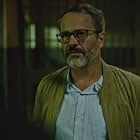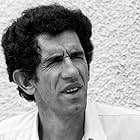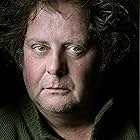A small town is stirred by anonymous notes delivered during the night, telling the secrets of its inhabitants.A small town is stirred by anonymous notes delivered during the night, telling the secrets of its inhabitants.A small town is stirred by anonymous notes delivered during the night, telling the secrets of its inhabitants.
- Awards
- 4 wins & 19 nominations
Photos
Dani Barros
- Trinidad
- (as Daniele Barros)
- Director
- Writers
- All cast & crew
- Production, box office & more at IMDbPro
Storyline
Did you know
- TriviaFinal film of Irving São Paulo.
Featured review
"O Veneno da Madrugada", Ruy Guerra's fourth film based on the oeuvre of his personal friend and Nobel-Prize winner Gabriel García Márquez, was one that Guerra kept battling to get financed for 14 years (!). This time, he takes GGM's very first novel "La Mala Hora" and uses its rather déjà vu plot -- a small town's population plagued by poisonous anonymous letters -- as pretext to play around with story-telling (the events, real and imagined, are staged non-chronologically, with some key repeated scenes as narrative anchors, in a sort of Resnais meets Cortázar puzzle), atmosphere (the heavy, constant rain), decors (an unidentified, symbolic, decadent Latin-American tiny village in the middle of nowhere), performances (in anti-naturalistic key) and themes focusing on some classic negative Latin-American "heritages" such as pious Catholicism, caudillismo, corruption, racism, torture, sexual repression and abuse, nepotism, mysticism, fatalism, machismo etc. There's a nightmarish, funereal feel to the film -- it's a sort of VERY bleak, pitch black Latin-American version of Clouzot's "Le Corbeau".
The film is very demanding on the audience (you really have to pay attention if you want to make a sense of it), relentlessly gloomy (its black sense of humor is too grim) and very dark (literally: it must be one of the most scarcely lit films ever made). Guerra explores expressionist visuals, with extreme camera angles and placements, working with a color palette of dark reds and greens, thick browns and blacks. Most of the time, the actors are seen from behind, very dimly lit, wearing hats or scarves, their faces partially or totally in the dark, and often we can only tell who's who by recognizing their (very bluntly dubbed) voices; you'll feel like reaching for a flashlight to brighten the screen:)). The dialog mixes casual conversation with enigmatic, philosophical passages, complete with the presence of a David Lynch-ian esoteric dwarf!
A resounding commercial flop in theaters, "Veneno..." gets a second chance with the DVD release, which may actually benefit the film, as we can press the pause button to try making sense out of things (Guerra does give us the "anchor" scenes to help us out) or just to take a deep breath before plunging again into the claustrophobic darkness. "Veneno..." is bound to appeal mainly to fans of director Guerra's recent work (e.g. "Estorvo") and those sincerely interested in experimental film language, but will probably disappoint fans or his earlier work (undisputed masterpieces like "Os Cafajestes", "Os Fuzis"). Though it's an undeniably bold and risky move by 75 year-old Guerra, "Veneno..." remains strangely uninvolving and unnecessarily hermetic -- after all, Guerra turns the work of an extremely popular, accessible writer like García Márquez into an enigmatic, mind-bending and very difficult film.
The film is very demanding on the audience (you really have to pay attention if you want to make a sense of it), relentlessly gloomy (its black sense of humor is too grim) and very dark (literally: it must be one of the most scarcely lit films ever made). Guerra explores expressionist visuals, with extreme camera angles and placements, working with a color palette of dark reds and greens, thick browns and blacks. Most of the time, the actors are seen from behind, very dimly lit, wearing hats or scarves, their faces partially or totally in the dark, and often we can only tell who's who by recognizing their (very bluntly dubbed) voices; you'll feel like reaching for a flashlight to brighten the screen:)). The dialog mixes casual conversation with enigmatic, philosophical passages, complete with the presence of a David Lynch-ian esoteric dwarf!
A resounding commercial flop in theaters, "Veneno..." gets a second chance with the DVD release, which may actually benefit the film, as we can press the pause button to try making sense out of things (Guerra does give us the "anchor" scenes to help us out) or just to take a deep breath before plunging again into the claustrophobic darkness. "Veneno..." is bound to appeal mainly to fans of director Guerra's recent work (e.g. "Estorvo") and those sincerely interested in experimental film language, but will probably disappoint fans or his earlier work (undisputed masterpieces like "Os Cafajestes", "Os Fuzis"). Though it's an undeniably bold and risky move by 75 year-old Guerra, "Veneno..." remains strangely uninvolving and unnecessarily hermetic -- after all, Guerra turns the work of an extremely popular, accessible writer like García Márquez into an enigmatic, mind-bending and very difficult film.
Details
- Runtime1 hour 58 minutes
- Color
- Sound mix
- Aspect ratio
- 1.85 : 1
Contribute to this page
Suggest an edit or add missing content

Top Gap
By what name was O Veneno da Madrugada (2005) officially released in Canada in English?
Answer






